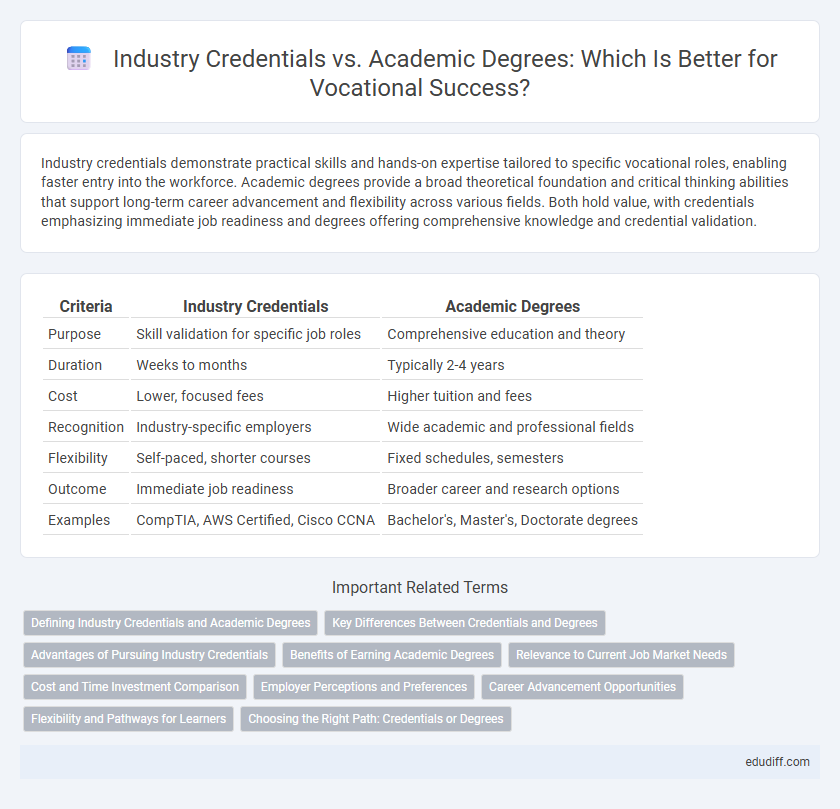Industry credentials demonstrate practical skills and hands-on expertise tailored to specific vocational roles, enabling faster entry into the workforce. Academic degrees provide a broad theoretical foundation and critical thinking abilities that support long-term career advancement and flexibility across various fields. Both hold value, with credentials emphasizing immediate job readiness and degrees offering comprehensive knowledge and credential validation.
Table of Comparison
| Criteria | Industry Credentials | Academic Degrees |
|---|---|---|
| Purpose | Skill validation for specific job roles | Comprehensive education and theory |
| Duration | Weeks to months | Typically 2-4 years |
| Cost | Lower, focused fees | Higher tuition and fees |
| Recognition | Industry-specific employers | Wide academic and professional fields |
| Flexibility | Self-paced, shorter courses | Fixed schedules, semesters |
| Outcome | Immediate job readiness | Broader career and research options |
| Examples | CompTIA, AWS Certified, Cisco CCNA | Bachelor's, Master's, Doctorate degrees |
Defining Industry Credentials and Academic Degrees
Industry credentials are specialized certifications awarded by professional organizations or trade associations that validate specific skills and competencies relevant to particular professions or industries. Academic degrees are formal educational qualifications granted by accredited colleges or universities, representing comprehensive knowledge and theoretical understanding in a broad field of study. While industry credentials emphasize practical expertise and immediate job readiness, academic degrees focus on in-depth academic training and foundational knowledge.
Key Differences Between Credentials and Degrees
Industry credentials emphasize practical skills and hands-on experience directly applicable to specific vocational roles, often obtained through targeted certification programs. Academic degrees provide broader theoretical knowledge and critical thinking skills across a field, typically requiring several years of study at colleges or universities. Credentials are usually faster to obtain and more specialized, while degrees offer comprehensive education with potential for advanced career opportunities and academic progression.
Advantages of Pursuing Industry Credentials
Industry credentials offer targeted skill validation that aligns directly with employer needs, enhancing job readiness and employability in specific vocational fields. These certifications often require less time and financial investment compared to traditional academic degrees, allowing for faster entry into the workforce. Employers increasingly prioritize industry credentials as proof of practical expertise and up-to-date knowledge in rapidly evolving industries such as IT, healthcare, and manufacturing.
Benefits of Earning Academic Degrees
Earning academic degrees offers comprehensive knowledge and critical thinking skills that enhance long-term career adaptability and advancement opportunities. Degrees often provide broader theoretical foundations and access to research resources, which support innovation and specialized expertise within vocational fields. Employers increasingly value academic credentials for leadership roles, signaling commitment and a well-rounded educational background.
Relevance to Current Job Market Needs
Industry credentials align directly with the skills and technologies demanded by employers, ensuring immediate applicability and job readiness. Academic degrees offer comprehensive theoretical knowledge but may lag behind rapidly evolving industry standards. Emphasizing credentials can boost employability by demonstrating specialized expertise matched to current market trends.
Cost and Time Investment Comparison
Industry credentials typically require lower financial investment, ranging from a few hundred to a few thousand dollars, compared to academic degrees that often cost tens of thousands in tuition and fees. Time commitment for industry certifications is usually shorter, often taking weeks to a few months, whereas academic degrees generally demand several years of study. This cost and time efficiency makes industry credentials a practical option for rapid entry or advancement in vocational fields.
Employer Perceptions and Preferences
Employers increasingly value industry credentials for their direct applicability and demonstration of specific skills aligned with job requirements. Academic degrees remain important for foundational knowledge and critical thinking, though many hiring managers prioritize practical experience showcased by certifications. The preference varies by sector, with tech and skilled trades placing a higher emphasis on certifications over traditional degrees.
Career Advancement Opportunities
Industry credentials offer targeted skills recognized by employers, accelerating career advancement in specialized vocational fields. Academic degrees provide comprehensive knowledge and theoretical foundations, often leading to broader career options and higher leadership roles. Combining both credentials and degrees maximizes opportunities for promotions and salary increases across diverse industries.
Flexibility and Pathways for Learners
Industry credentials offer flexible, targeted skill acquisition that aligns directly with job market demands, enabling learners to quickly enter or advance in specific trades. Academic degrees provide broader theoretical knowledge and foundational principles, facilitating diverse career pathways and opportunities for further education. Combining both credentials and degrees creates versatile learners equipped to adapt to evolving industry needs and lifelong learning.
Choosing the Right Path: Credentials or Degrees
Choosing the right path between industry credentials and academic degrees depends on career goals and job market demands. Industry credentials offer specialized, practical skills that employers often prioritize for immediate job readiness, while academic degrees provide comprehensive theoretical knowledge and broader career flexibility. Evaluating factors such as industry requirements, time investment, and long-term career advancement can guide individuals toward the most suitable educational path.
Industry Credentials vs Academic Degrees Infographic

 edudiff.com
edudiff.com